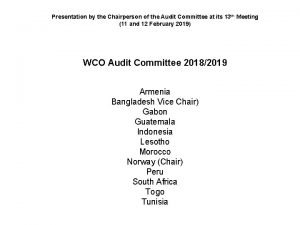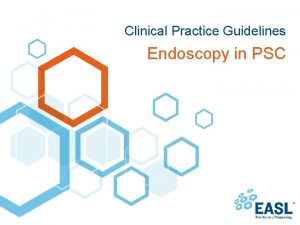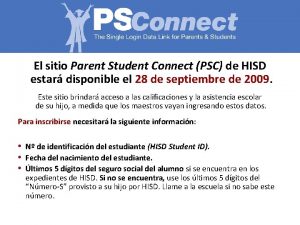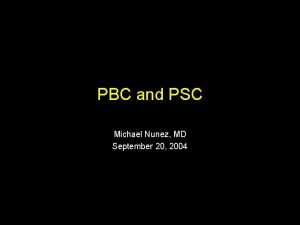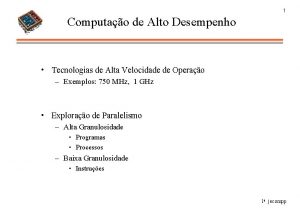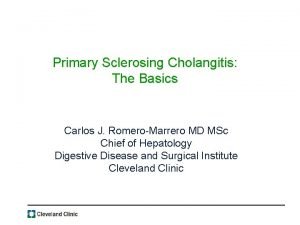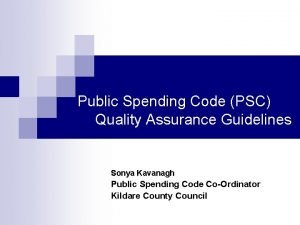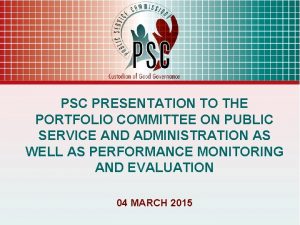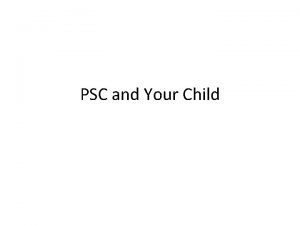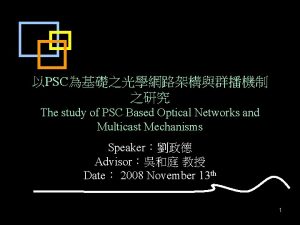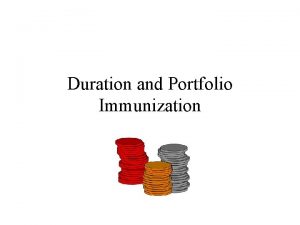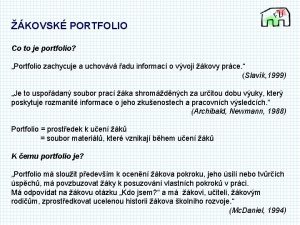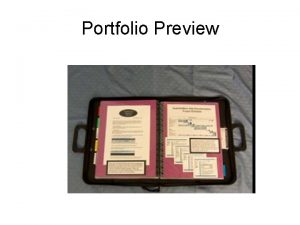PSC PRESENTATION TO THE PORTFOLIO COMMITTEE ON THE





































- Slides: 37

PSC PRESENTATION TO THE PORTFOLIO COMMITTEE ON THE EVALUATION OF THE IMPACT OF THE POLICY AND PROCEDURE ON INCAPACITY LEAVE AND ILL-HEALTH RETIREMENT (PILIR) ON SICK LEAVE TRENDS IN THE PUBLIC SERVICE 11 MARCH 2015

OUTLINE OF THE PRESENTATION § The presentation will cover the following: • Mandate, role and responsibilities of the PSC • Background • PILIR framework: overview • PILIR impact evaluation • PILIR Roundtable • Sick leave trends • Application approval grievances (wrt PILIR) • Conclusion 2

MANDATE, ROLE AND RESPONSIBILITIES OF THE PSC The Public Service Commission (PSC) derives its mandate from sections 196 of the Constitution and the Public Service Act, which vests it with powers and functions “to investigate, monitor and evaluate the organization and administration, and personnel practices, of the public service” and to propose measures to ensure effective and efficient performance within the public service”. In terms of section 196 (f), the PSC may of its own accord or on receipt of any compliant, “investigate and evaluate the application of personnel and administration practices, and report to the relevant executive authority and legislature”. The PSC is also charged with the responsibility to investigate grievances of public service employees and to monitor adherence to applicable procedures in the public service. 3

BACKGROUND § § In line with its mandate, the Public Service Commission (PSC) has produced several reports on Human Resource Management issues. Some of these reports focused on the management of leave within the Public Service and a number of findings were made in this regard. One of the key findings was that the abuse and poor management of sick leave have serious financial implications for the State as well as an adverse impact on service delivery due to the high rate of absenteeism. The Policy and Procedure on Incapacity Leave and Ill-Health Retirement (PILIR) was developed by the Department of Public Service and Administration (DPSA) to, amongst others, deal with the challenges raised by the PSC. It was implemented in government in a phased approach with effect from June 2006. 4

PILIR FRAMEWORK: OVERVIEW 5

OVERVIEW OF PILIR The objectives of PILIR are to set up structures and processes, which will ensure- • intervention and management of incapacity leave in the workplace to accommodate temporary or permanently incapacitated employees; and • that rehabilitation, re-skilling, re-alignment and retirement, where applicable, of temporary or permanently incapacitated employees are facilitated, where appropriate. The mission of PILIR is to- • adopt a holistic approach to health risk management, by seeking synergies with wellness and disease management programmes provided by employees’ medical schemes and by implementing sick leave management as well as rehabilitation and re-skilling structures in conjunction with health risk management; • prevent abuse of sick leave by managing incapacity or ill-health as far as possible; 6

OVERVIEW OF PILIR The mission of PILIR is to- • adopt a scientific approach to health risk management bases on sound medical, actuarial and legal principles; • involve the various stakeholders in the health risk management processes and structures; • implement health risk management that is consistent, fair and objective; and • support health risk management that is cost effective and financially sound. In the management of incapacity leave and ill-health retirement, the role players are the following: • The dpsa will develop and maintain PILIR and shall be centrally responsible for the appointment of a panel of accredited Health Risk Managers and will also provide advice on the interpretation and application of PILIR. • The Government Employees Pension Fund (GEPF) is responsible for dealing with the processing of Employer-approved applications for ill-health retirements. 7

OVERVIEW OF PILIR In the management of incapacity leave and ill-health retirement, the role players are the following: • The Health Risk Manager (HRM) is an entity of independent multi-disciplinary medical experts, specialising in occupational medicine, appointed by the dpsa to a panel of accredited Health Risk Managers and individually contracted by the Employer, to assess and provide advice to the Employer in respect of an employee’s application for incapacity leave and ill-health retirement within specified timeframes. The systems and administrative capacity for handling the volume of forms, as well as the medical knowledge and experience to do incapacity leave and ill-health retirement assessments are the responsibility of the Health Risk Manager. The Health Risk Manager shall provide regular reports to the dpsa and the Employer. 8

OVERVIEW OF PILIR In the management of incapacity leave and ill-health retirement, the role players are the following: • The Employer is for purposes of PILIR the departments and organisational components listed in Schedules 1 to 3 of the PSA. The Employer shall in terms of PILIR be responsible to process applications and complete reports within the specified time frames and where applicable the Employer will engage with the Health Risk Manager, the dpsa and GEPF. The Employer shall, within the scope of his/her authority and with due consideration of the Health Risk Manager’s advice, take a final decision on an employee’s application for incapacity leave and/or ill-health retirement. • The Employee shall submit application forms for either incapacity leave or illhealth retirement. The employee shall submit medical certificates and reports as determined in terms of PILIR and in accordance with the Leave Determination. 9

OVERVIEW OF PILIR According to section 7 of the PILIR framework: 7. 1. 1. “Incapacity leave is not an unlimited amount of additional sick leave days at an employee’s disposal. Incapacity leave is additional sick leave granted conditionally at the Employer’s discretion, as provided for in the Leave Determination and PILIR. ” 7. 1. 2. “An employee who has exhausted his/her normal sick leave, referred to in the Leave Determination, during the prescribed leave cycle and who according to the treating medical practitioner requires to be absent from work due to a temporary incapacity, may apply for temporary incapacity leave with full pay on the applicable application forms prescribed in terms of PILIR in respect of each occasion”. Paragraph 7. 1. 5. “For an employee’s application for temporary incapacity leave to be considered, the employee must submit sufficient proof that she/he is too ill to/injured to perform her/his work satisfactorily; and that the application form must be accompanied by a medical certificate issued and signed by a medical practitioner that certifies his or her condition as temporary incapacity. ” 10

OVERVIEW OF PILIR 7. 1. 7. “If overcome by a sudden incapacity, the employee must personally notify his/her supervisor/manager immediately. ” 7. 1. 8. “an employee must submit an application form for temporary incapacity leave personally or through a relative, fellow employee or friend within 5 five working days after the first day of absence” 7. 1. 9 stipulates that if an employee fails to submit an application within the period indicated in paragraph 7. 1. 8 above, the following arrangement apply” 7. 1. 9. 1 “The employee’s manager/supervisor must immediately notify the employee that if such application is not received within 2 working days, the sick leave will be deemed to be leave without pay. If the employee fails to submit the application on time or submit compelling reasons or compelling reasons exist why the application cannot be submitted, the supervisor/manager must immediately inform the relevant personnel section/office that relevant absence must be covered by annual leave (with the employees consent) and/or unpaid leave if sufficient annual leave credits are available and if the employee failed to notify the Employer of his her choice. ” 11

OVERVIEW OF PILIR 7. 1. 9. 2. Failure by the employee to submit an application form within the stated periods, or failure by the supervisor/manager to properly manage it, must be viewed in a serious light and disciplinary steps should be taken. 7. 2. “The employer must within 5 working days of receipt of the employee’s application for temporary incapacity verify that the employee has completed and signed the Parts A and B of the application form. An unsigned and incomplete form must be returned immediately to the employee to be resubmitted within 5 working days. An incomplete and unsigned application form shall not be considered. ” 7. 2. 7. “The Health Risk Manager may request further information before concluding its advice to the Employer” 11. 1. “An employee who is not satisfied by a decision by the Employer may lodge a grievance as contemplated in terms of the rules made by the Public Service Commission. 12

PILIR IMPACT EVALUATION 13

PILIR IMPACT ON SICK LEAVE TRENDS § § During the 2009/10 financial year, the PSC conducted a study to evaluate the impact of PILIR on sick leave trends in the Public Service. The objectives of the study were as follows: • Assess sick leave trends and reasons thereof, in the national departments • • of Labour, Health, Basic and Higher Education and Training as well as provincial departments of Health and Education in all nine provinces; Do a comparative analysis per financial year reflecting trends prior to implementation of PILIR in order to assess whethere has been any change in sick leave trends or not; Identify success factors that are critical to the effective implementation of PILIR; Identify barriers impacting on the implementation of PILIR in the Public Service; and Generate recommendations to improve the implementation of PILIR and sick leave management in the Public Service. 14

PILIR EVALUATION FINDINGS § 60% of all respondents from the sampled departments indicated an understanding of PILIR and the different functions of key role players. § Leave policies were in place in almost all sampled departments, and there was 100% utilization of the services of Health Risk Managers. § In national departments there was an average of 3. 8% reduction in the number of sick leave days taken after the implementation of PILIR. This is in line with the 3% observed, at provincial level where a decrease was observed in only 66% of the departments of Education and Health. § Despite the average 3% reduction in sick leave days taken post implementation of PILIR, the total cost of sick leave taken in the three sampled national departments increased by 26% post implementation of PILIR. § Employees from both the National and Provincial departments were usually absent on sick leave on Mondays and this practice has not changed post implementation of PILIR. 15

PILIR EVALUATION FINDINGS § With regard to the processing of applications and the overall administration of PILIR – the following findings were made: • Non-adherence to timeframes for the processing of applications by all parties involved, namely: employees, designated officers, Health Risk Managers and Heads of Departments. • Many managers are not managing the absenteeism of employees whose Temporary/ Permanent Incapacity Leave applications have been declined. • PILIR has resulted in an increased workload for internal role-players (i. e managers and HODs) and an increase in costs for departments. • Medical Practitioners from both private and public practices/hospitals are reluctant to complete the Temporary/Permanent Incapacity Leave forms because they say the forms are bulky and time consuming. • Medical Practitioners are reluctant to breach confidentiality by disclosing their patients’ health status when requested by departments. 16

PILIR EVALUATION RECOMMENDATIONS The PSC made the following recommendations: § Managers in all departments must monitor sick leave closely and this information should form part of the employees’ performance agreements. § Human Resource Managers must be held accountable and must ensure that sick leave records are captured timeously and accurately on PERSAL. § All stakeholders should strive to meet the 30 days timeframe for processing applications for Temporary Incapacity Leave as well as communicating the outcome to the employee. § The DPSA should review Long Term Incapacity, the Permanent Incapacity Leave and Ill-Health Retirement application forms taking into consideration the challenges experienced by employees when requesting completion of such forms by Medical Practitioners. § The DPSA must add a clause to the policy that indicates that in the event of a deceased employee, Human Resource units must ensure that outstanding Temporary/Permanent Incapacity Leave and/or Ill-Health Retirement applications are completed and the outcome processed before any pension pay-out is processed. 17

PILIR ROUNDTABLE 18

PILIR ROUNDTABLE DISCUSSION § Due to a need for further discussions on PILIR issues, a § Roundtable Discussion was organised in October 2013, to: • Create a platform for experts and delegates to discuss challenges experienced within departments in implementing PILIR; • Share best practices and to identify strategies that could be implemented within departments in capping the identified challenges; and • Identify possible solutions to persisting challenges experienced in implementing PILIR successfully. The Roundtable was attended by delegates from national and provincial departments, the DPSA, PILIR champions, Human Resource Managers, Labour Relations Officers, and Medical practitioners in the fields of Psychiatry, Neurology and respiratory system diseases.

PILIR ROUNDTABLE DISCUSSION § The following challenges were raised during the Roundtable: • Difficulties with the handling of grievances emanating from the assessment of incapacity leave applications, e. g. departments are unable to handle grievances with different medical opinions from employees’ medical practitioners and Health Risk Managers. Thus most grievances are forwarded unresolved to the PSC. • PILIR application forms are cumbersome, which results in some employees not being assisted by medical practitioners and having to pay extra money for the completion of the forms. • Incomplete diagnostic reports provided by Medical practitioners even though employees have consented to the divulging of their information to third parties; thus resulting not being recommended for approval due to insufficient information. • Due to delays in the appointment of new HRM service providers, departments have a backlog of unprocessed PILIR applications. 20

PILIR ROUNDTABLE RECOMMENDATIONS § The following are some of the recommendations from the Roundtable discussion, to address the challenges raised. • Medical practitioners who refuse to provide departments with the full medical reports even though the employee has consented should be reported to the Health Practioners Council of South Africa (HPCSA) for non-cooperation and non-compliance with the applicable Code of Conduct. • Departments must conduct incapacity hearings as soon as they observe a need and not wait until leave is exhausted before instituting incapacity hearing processes or disciplinary processes where applicable. • HRM components should identify leave trends and engage the health and wellness officials to develop a plan to address the issues identified in the trends report. 21

PILIR ROUNDTABLE RECOMMENDATIONS § The DPSA should arrange training for labour relations officers, which must § § § be facilitated by an experienced and reputable Labour Relations specialist, on the implementation of PILIR and the handling of Ill-Health grievances. The DPSA should address the backlog issue with departments, HRMs and the AG; and engage with the Public Sector medical practitioners on PILIR to enable them to adhere to the PILIR requirements. The DPSA should develop a plan to provide support to health and wellness officials in departments. The DPSA and departments should conduct information sessions for all employees on the implementation of PILIR. 22

SICK LEAVE TRENDS 23

SICK LEAVE TRENDS FOR ALL DEPARTMENTS § The average number of days for sick leave per employee over the last five § years have remained below 10 days. In respect of disability leave, the average number of days utilized per employee has been fluctuating, as illustrated by a peak in 2013/14 and nominal decline in 2014/15. 24

SICK LEAVE TRENDS FOR HEALTH AND CORRECTIONAL SERVICES § A trend analysis of sick leave for the two departments over 5 years, § indicate that Correctional Services has a high total average of sick leave days per employee. The average days for sick leave per employee in the Department of Health was below the national averages for most years. 25

DISABILITY LEAVE TRENDS FOR HEALTH AND CORRECTIONAL SERVICES § A trend analysis of disability leave for the two departments over the 5 § years indicate that Correctional Services has a high total average days of disability leave per employee. It is noted that in 2013, the Department of Health had no disability leave cases captured on the system. 26

APPLICATION APPROVAL GRIEVANCES (wrt PILIR) 27

GRIEVANCES LODGED WITHIN THE PUBLIC SERVICE § A grievance is defined in the Grievance Rules, as a “…dissatisfaction regarding an official act or omission by the employer which adversely affects an employee in the employment relationship, excluding an alleged dismissal. ” § Paragraph 11 of the PILIR framework states that “An employee who is not satisfied by a decision by the Employer may lodge a grievance as contemplated in terms of the rules made by the Public Service Commission. ” § To enable the PSC to report on the different types of grievances, grievances are classified in categories. Grievances relating to PILIR are captured within the category “Application approval”. 28

GRIEVANCES RELATING TO APPLICATION APPROVAL § There has over the years been an increase in grievances relating to application approval and the PSC has, in particular, noted an increase in PILIR grievances. § Employees are dissatisfied about the non-approval of their applications for temporary incapacity leave. Grievances reported by departments Grievances referred to the PSC 29

DEPARTMENTS OF HEALTH GRIEVANCES § A trend analysis of grievances in the category “application approval” reported by § national and provincial departments of Health shows an increase over a period of 5 years. Of the 27 “application approval” cases referred to the PSC in 2013/14, 12 related to PILIR. 30

DEPARTMENT OF CORRECTIONAL SERVICES GRIEVANCES § A trend analysis of grievances in the category “application approval” reported § by the Department of Correctional Services shows a high number of grievances within this category – but few cases were referred to the PSC. Of the 3 “application approval” cases referred to the PSC in 2013/14, 1 related to PILIR. 31

PSC FINDINGS AND RECOMMENDATIONS Apart from dealing with PILIR related challenges through the grievance process, the PSC is often approached by departments and/or the aggrived to assist. To this end, PSC was requested to investigate the management of leave in the police service in KZN. The investigation confirmed the following: § Poor management of leave; § Delays in processing of ill-health retirement applications; § Lack of delegations for provinces to finalise ill-health retirement applications; § Failure of departments to take decisions on ill-health applications resulting in the employment of personnel who have been incapacitated for years; § Non-approval of deserving cases (members dying after the application has been declined); § Non compliance with PILIR by all role players; and § Departments’/management’s over reliance on Health Risk Managers. The PSC is currently dealing with a ill-health retirement application (dated 24 January 2014) for another employee from the Department Correctional Services. 32

PSC FINDINGS AND RECOMMENDATIONS § In considering an application in terms of PILIR, the Health Risk Manager § § considers the trend in respect of sick leave taken by the employee and whether the employee uses his/her sick leave judiciously. In most cases, the Health Risk Manager recommends that an application should be declined based on the fact that the employee does not use his/her sick leave judiciously. The PSC found that in several cases, the departments' decision to decline the aggrieved’s application was based on reasons provided by the Health Risk Manager, which were more administrative in nature and not based on medical grounds. In some cases, it was found that the medical records provided by the aggrieved were not considered by the department. In other cases, it was found that the department failed to address the failure of the employee to submit the application forms within the prescribed period or to properly manage it. In instances where the grievance of an employee is found to be substantiated, the PSC recommends that the application should be approved. 33

CONCLUSION AND WAY FORWARD 34

CONCLUSION § The 2009/20 impact evaluation study, the roundtable discussions and findings from grievance investigations and on-going interventions have revealed that there is general non-compliance with the PILIR framework by all role players. § In addition, concerns regarding the lack of cooperation by Health Practitioners in completing the PILIR application forms remains a challenge and this issue is often linked with the fact that the PILIR application forms are considered to be ‘cumbersome’. § The financial implications on the state as employer, the effect on service delivery and the impact on the employee as a result of delays in finalising assessments for temporary incapacity leave and ill-health retirement applications by Health Risk Managers and departments remains cause for concern. 35

WAY FORWARD § The PSC will continue to conduct its monitoring and evaluation of the Public Service as mandated by the Constitution and report to Parliament on its findings. § The Portfolio Committee could: • Engage the DPSA on the extent of implementation of the PSC recommendations; • Request the DPSA to obtain information from departments on the total number of Public Servants who are chronically ill and are still awaiting feedback on their applications for ill-health retirement and put mechanisms in place to fast track the assessment and finalisation of such cases; and • Convene hearings with departments/sectors where ill-health applications are prevalent to gain an understanding of the underlying causes and impact on service delivery. 36

Thank you Siyabong a PSC Website: www. psc. gov. za National Anti-Corruption Hotline for the Public Service: 0800 701 12/17/2021 37
 Psc 1501 portfolio pdf
Psc 1501 portfolio pdf Portfolio committee on mineral resources and energy
Portfolio committee on mineral resources and energy Portfolio committee on higher education
Portfolio committee on higher education Portfolio committee on basic education
Portfolio committee on basic education Portfolio committee on communications
Portfolio committee on communications Portfolio committee
Portfolio committee Portfolio committee on basic education
Portfolio committee on basic education What is a portfolio
What is a portfolio Audit committee presentation
Audit committee presentation Loan committee presentation
Loan committee presentation Swe finance
Swe finance P&t committee presentation
P&t committee presentation Psc cuny vision benefits
Psc cuny vision benefits Psc group llc
Psc group llc Small duct psc
Small duct psc Phylogense
Phylogense Psc cuny welfare fund retirees
Psc cuny welfare fund retirees Easl guidelines psc
Easl guidelines psc Ceftrioxone
Ceftrioxone Steep grade sharp curves
Steep grade sharp curves Hisd psc
Hisd psc Cease meaning
Cease meaning Premier's sporting challenge medal
Premier's sporting challenge medal Public service talent pool
Public service talent pool Cholangiography factory
Cholangiography factory Nor urso psc
Nor urso psc Psc
Psc Concrete grade ratio table
Concrete grade ratio table Psc 01
Psc 01 Psc girder
Psc girder Phases of chronic hepatitis b
Phases of chronic hepatitis b Psc desempenho individual
Psc desempenho individual Norudca
Norudca Psc assurance
Psc assurance Psc-17 scoring
Psc-17 scoring Psc tracker app
Psc tracker app Pżw poszerzony przyczyny
Pżw poszerzony przyczyny Office management assistant psc
Office management assistant psc








